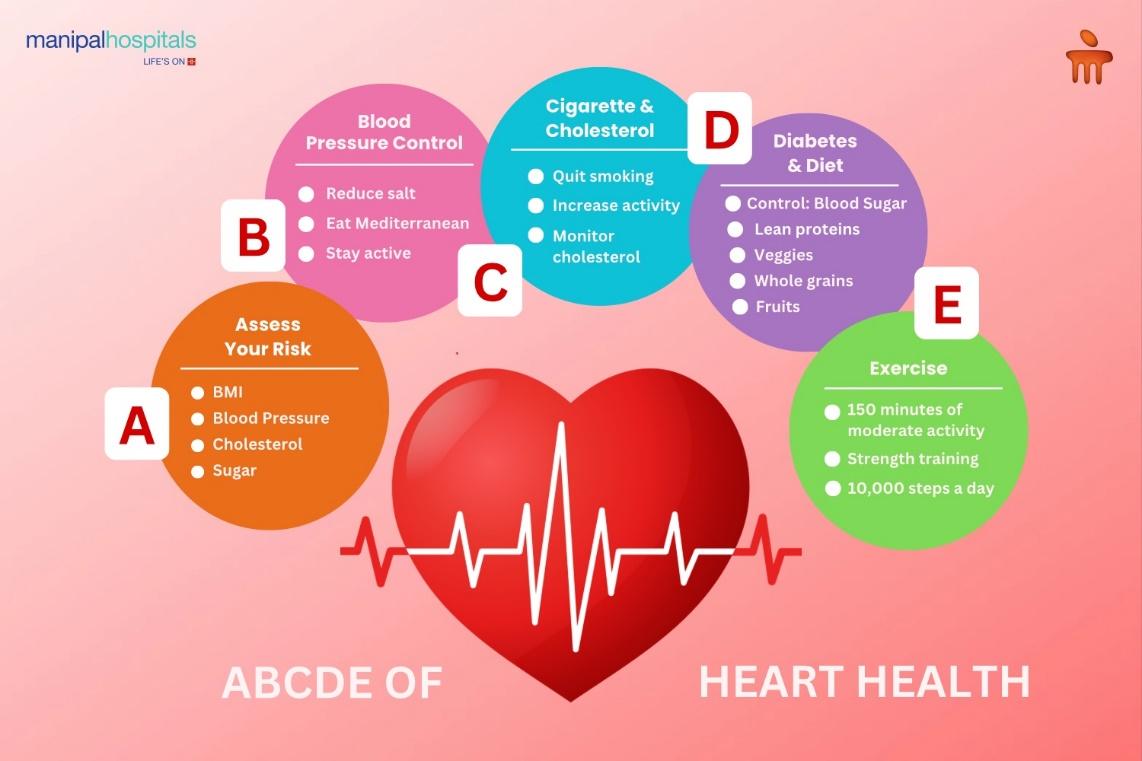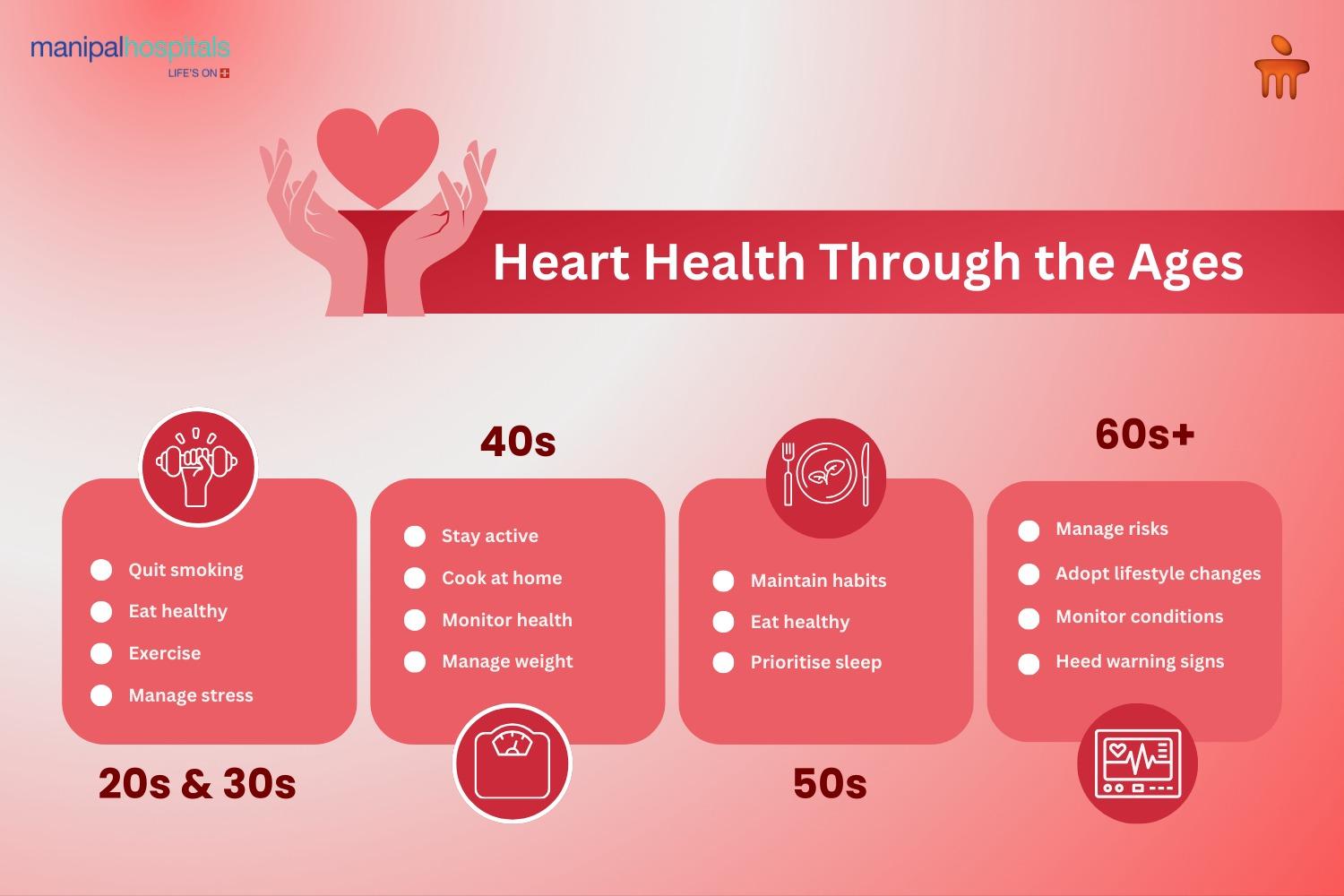
Hey there, heart health champion! Did you know that your ticker has been beating non-stop since before you were born? It's time we show it some love!
Most heart problems are asymptomatic at early stages. This is why we often tend to ignore the well-being of our hearts. However, different heart conditions develop slowly over many years. If your arteries get damaged, it can cause heart attacks and strokes. This is the result of several small yet wrong choices we make. This includes:
-
Unhealthy diet and weight
-
Minimal physical movement or activity
-
Stress
-
Smoking habit
Please note that these are just a few triggers that can cause heart issues. Hence, expert cardiologists suggest prevention is the kindest gift. This is applicable for any age, whether you’re in your 20s, your 50s or beyond.
So, let's dive into the ABCDE of heart health - a simple yet powerful strategy to keep your heart pumping strong for years to come.
This ABCDE algorithm for the Prevention of Heart Disease includes:

Synopsis
A is for Assess Your Risk
Here's what you need to check:
-
BMI: Aim for under 25
-
Blood Pressure: Check if it is below 140/90
-
Cholesterol: LDL should be under 130 mg/dL. You can even try to keep it lower if you're at high risk.
-
Sugar Levels: HbA1c below 6.4%. Fasting sugar should be less than 100 mg/dl.
-
Daily Steps: Practice for 10,000!
Remember, some risk factors are out of your control. For example, age, gender, and family history. However, besides that, there's still plenty you can do!
B is for Blood Pressure Control
High blood pressure is like a silent ninja - you might not feel it, but it's secretly damaging your arteries. Keep that ninja in check with these tips:
-
Cut down on salt. Aim for less than 2,400 mg a day.
-
Embrace the Mediterranean diet. Say hello to olive oil and veggies!
-
Keep up with certain physical activities.
C is for Cigarette Cessation and Cholesterol Control
Smoking is your heart's arch-nemesis. So, quitting is the single best thing you can do for your heart. Need help? Try:
-
Increasing your physical activity.
-
Finding a new hobby to keep your hands busy.
-
Seeking support from friends, family, or a support group.
As for cholesterol, Low-Density Lipoprotein (LDL) is the "Bad" one. On the other hand, High-Density Lipoprotein is the "Happy" cholesterol. Keep the bad one in check and the happy one up! You can consult an experienced cardiologist for some practical tips on how to keep your cholesterol in check.
D is for Diabetes Treatment and Diet Optimisation
Diabetes means you have to manage your blood sugar levels. Only this can keep your heart health fine-tuned.
Besides that, a heart-healthy diet is key for everyone, no matter what is your health condition. Here's a quick guide:
-
Load up on heart-healthy fruits, veggies, and whole grains.
-
Choose lean proteins like fish, poultry, and legumes.
-
Swap saturated fats for healthy oils like olive oil.
-
Ditch the processed foods and added sugars, and incorporate heart-healthy foods in your diet.
E is for Exercise
Last but definitely not least - get moving! Exercise is like a magic pill for your heart. Aim for:
-
150 minutes of moderate aerobic activity per week.
-
Strength training exercises at least twice a week.
-
10,000 steps a day (your smartphone can help you track this!)
Remember, the best exercise is the one you enjoy. So, find something fun and stick with it!
Heart Health Through the Ages
Taking care of your heart needs to change as you age. Here's a quick rundown of a focus on a healthy heart as per your age:

Above everything, the most important is to go on regular check-ups. Schedule appointments with your cardiologist from time to time. This will keep you updated about your heart health. Hence, you can take the measures accordingly.
Remember, any time is the right time to start taking care of your heart, it’s never too early nor too late. Your future self will thank you!
FAQ's
Absolutely! Chronic stress is an established risk of heart disease. Try stress-management techniques like exercise, meditation, or talking to a therapist.
Yes! Heart disease develops over time, so the habits you form now can significantly impact your future heart health. It's never too early to start prevention.
Moderation is key. An occasional treat won't derail your heart health, but try to make healthy choices most of the time. Remember, it's about lifestyle, not deprivation!



















 4 Min Read
4 Min Read













